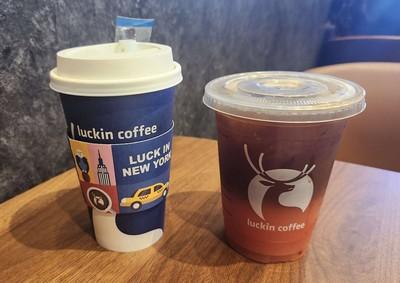
What taste does Luckin Coffee bring to US?
Ding Gang
Monday marked an interesting moment in the global coffee scene: Luckin Coffee officially opened its doors in Manhattan, New York. As New Yorkers sip their fruity Luckin lattes, few might realize that the journey of this cup across the Pacific tells a story rich with cultural dialogue and exchange. Coffee is constantly evolving as it travels – it diversifies our beverage choices and fosters a more colorful, multicultural world.
For years, Starbucks’ Americanos and lattes have stood as symbols of America’s industrial age and consumer culture. When Starbucks first entered China, it was seen as a bold and unlikely experiment. Most Chinese consumers weren’t used to the bitterness of black coffee, so Starbucks adjusted, offering sweeter, milkier drinks that slowly trained an entire generation’s palate.
As China’s coffee market matured, local innovation became the key to success for homegrown brands. In 2024, Chinese coffee consumption reached nearly 300,000 tons, making China the world’s fastest-growing and largest emerging coffee market in just a few years.

Founded in 2017, Luckin is China’s fastest-growing coffee chain, with over 24,000 stores across the country. By focusing on flexible product innovation, digital operations and affordability, Luckin has catered to young Chinese consumers with fresh, diverse flavor profiles.
Beyond just coffee, Luckin has revolutionized retail through technology, turning the traditional coffee business into a fully online, data-driven enterprise. Customers can craft their drink orders and pay in seconds, all from a phone app.
Luckin’s debut in New York also highlights a bigger picture: The story of coffee is inseparable from the story of globalization.
Coffee’s roots in China date back to the 19th century when French missionaries first brought coffee plants to Yunnan Province. After decades of fits and starts, the industry only flourished with China’s economic reforms.
At one point, Yunnan produced the vast majority of China’s coffee, but China’s approach to coffee cultivation took its own distinctive path. Government-driven poverty alleviation enabled farmers in remote Yunnan to lift themselves out of poverty and invest in specialty coffee. Today, Yunnan coffee is one of China’s key exports to the world, with 140,000 tons of beans produced annually on its rich soil and exports reaching nearly 30 countries and regions.
Luckin is one of Yunnan’s largest buyers. For instance, its fruit-processing plant in Baoshan alone handles 5,000 tons of fruit per year, supporting 20,000 local farmers. Many of Luckin’s signature blends feature Yunnan’s distinctive small-bean coffee, valued for its gentle acidity and chocolatey aftertaste.
With releases like “100 percent Yunnan Single Origin,” Luckin connects the hard work of farmers from remote villages to the coffee cups of city dwellers.
For Luckin, featuring Yunnan coffee isn’t just a geographic decision, it’s a natural connection with China’s broader development.
Of course, the world isn’t short on coffee brands, and Luckin’s entry into this competitive field comes with immense challenges.
The US is the world’s most mature and developed coffee market. Starbucks alone has over 17,000 domestic stores, and numerous other premium brands have already established a presence in the market. For Luckin, entering such a saturated space will take guts – and serious innovation. But inviting Americans to taste something new and distinctly Chinese is the next logical step in a globalizing drinks market.
The rise of China’s coffee industry and the Luckin brand isn’t just about catching up. It’s about expanding the world’s coffee map, bringing fresh perspectives and flavors, and introducing the world to Chinese-style coffee, one cup at a time.
As the global coffee market continues to grow, there’s an increasing opportunity for new players and emerging tastes. Starbucks will always have its Vanilla Latte, and Luckin will continue to roll out its unique coconut milk drinks in China. What’s truly exciting is how coffee, now more than ever, serves as a bridge – a place where cultures meet and mix.
The next time a New Yorker picks up a Luckin cup, maybe they’ll notice a subtle, lingering finish reminiscent of Yunnan’s distinctive teas, connecting two worlds in a single sip.
The writer is a senior editor with the People’s Daily and currently a senior fellow with the Chongyang Institute for Financial Studies at the Renmin University of China
